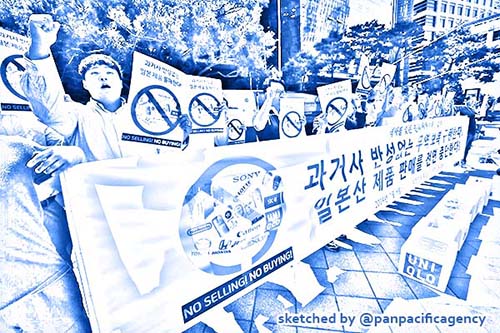S. Koreans’ expenditures in Japan down 60 percent amid boycott in Aug

South Korean merchants stage a rally to denounce Japanese government's decision on their export to South Korea in front of the Japanese embassy in Seoul on Friday. The signs read: "Boycott Japanese products." Photo: AP Photo/Ahn Young-joon. Sketched by the Pan Pacific Agency.
SEOUL, Oct 3, 2019, Yonhap. South Koreans’ expenditures made in Japan moved down a whopping 60 percent in August from a year earlier amid the growing trade row between Seoul and Tokyo, which led to a boycott of Japanese products here, including traveling to the Asian neighbor, data showed Thursday, reported the Yonhap.
The number of transactions made with credit cards in Japan valued US$600 or above reached 11,249 cases in August, which marked a drastic decline from 28,168 cases reported last year, according to the data compiled by the Korea Customs Service.
In terms of the combined value, the figure reached $12 million — including only those $600 or above — down 57 percent from $28 million posted a year earlier, it added.
“The numbers show that South Koreans are refraining from visiting Japan since Tokyo’s economic retaliation,” said Rep. Shim Ki-joon of the ruling Democratic Party, claiming the figure is expected to decrease further down the road.
The number of South Korean visiting Japan also reached 308,700 in August, down 48 percent on-year, according to the Japan National Tourism Organization.
South Korea and Japan have been facing an unprecedented trade dispute, after Tokyo abruptly started to regulate exports of three industrial materials to Asia’s No. 4 economy in July, citing security issues.
Japan’s export restriction is widely seen as a retaliation against a Seoul court’s ruling last year that ordered Japanese firms to compensate victims of their wartime forced labor, during Japan’s 1910-1945 brutal colonial rule of the Korean Peninsula.
Thus, South Koreans have been staging a boycott against Japanese products, calling for Tokyo to make a sincere move in settling the historical issues.
Tokyo says the export restriction did not come as retaliation and was inevitable due to South Korea’s lax export control of sensitive goods. It has not, however, provided any piece of evidence behind the allegation.